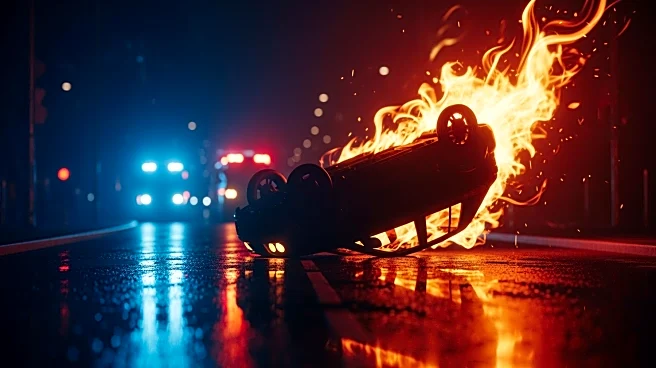What is the story about?
What's Happening?
Federal law enforcement officials dismantled parts of the White House Peace Vigil, a protest that has been ongoing for over 40 years in Lafayette Square, following an order from President Trump. The removal occurred early Sunday morning, after Brian Glenn, a correspondent for Real America’s Voice, described the vigil's blue tent as an 'eyesore' to the President. Despite initial resistance from vigil volunteers, including Will Roosien, who was briefly detained, the structure was partially dismantled, leaving behind flags and placards. The vigil, which calls for nuclear disarmament, has been a fixture in Washington D.C., surviving multiple administrations and weather events.
Why It's Important?
The dismantling of the Peace Vigil highlights ongoing tensions between public protest rights and government actions under President Trump’s administration. The vigil, a symbol of continuous protest against nuclear weapons, represents broader issues of free speech and public demonstration rights. The removal may impact public perception of the administration's stance on civil liberties and could provoke further protests or legal challenges. Stakeholders such as civil rights groups and political leaders may view this as a significant encroachment on First Amendment rights, potentially leading to increased activism and advocacy for protest protections.
What's Next?
The dismantling of the Peace Vigil may lead to legal challenges or increased protests from civil rights groups and activists. Del. Eleanor Holmes Norton has expressed support for the vigil, emphasizing its constitutional protection under the First Amendment. The administration's actions could prompt further scrutiny and debate over public protest rights in Washington D.C. and nationwide. Additionally, the vigil's organizers may seek alternative methods to continue their demonstration, potentially leading to new forms of protest or advocacy.
Beyond the Headlines
The removal of the Peace Vigil raises questions about the balance between public safety and the right to protest. Ethical considerations regarding the government's role in regulating public demonstrations and the impact on democratic expression are significant. The event may also influence future policies on public land use and protest regulations, potentially affecting long-term civil liberties and public engagement in political discourse.















